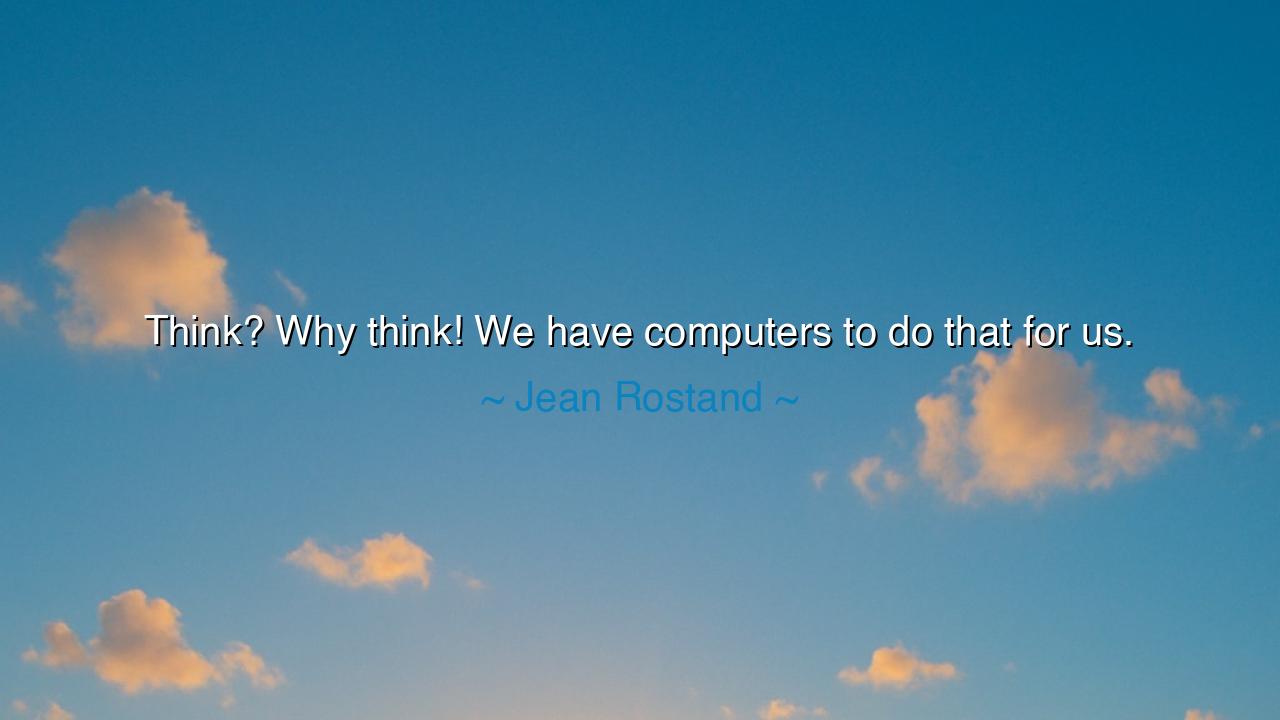
Think? Why think! We have computers to do that for us.






"Think? Why think! We have computers to do that for us." – Jean Rostand
In the modern age, where technology is omnipresent, the human mind is increasingly confronted by a world of convenience and instant gratification. Jean Rostand’s words, though spoken with a touch of irony, reveal a profound truth about the relationship between humans and the machines they create. In this era, when the computer has become an extension of the mind, thinking—once the proud hallmark of human nature—is now often outsourced to these mechanical creations. No longer must the human brain carry the burden of complex calculations or exhaustive problem-solving. We have computers, designed to think for us, to relieve us of the intellectual effort once required in daily life. But is this convenience truly a gift, or is it a trap that diminishes the very essence of human intelligence?
The ancient world, filled with great minds such as Socrates, Plato, and Aristotle, revered the act of thinking as the path to wisdom. To think, to question, to seek understanding—this was not merely an intellectual exercise but a moral and spiritual pursuit. Socrates famously claimed, "The unexamined life is not worth living," emphasizing the importance of thought in the development of the self and the soul. In those days, the mind was a revered tool, sharpened through continuous practice and intellectual engagement. Today, however, Rostand’s words point to a world in which we are increasingly relying on machines to do the thinking for us, surrendering the ancient wisdom that arose from the act of deep contemplation and personal reflection.
Consider the ancient Greeks, whose contributions to mathematics, philosophy, and science were built upon a foundation of self-reliance. Euclid, the great mathematician, wrote the "Elements," a work that laid out the principles of geometry and logic that have shaped Western thought for millennia. Pythagoras similarly formulated the famous Pythagorean theorem by relying on the power of his own mind. These thinkers did not have machines to do their thinking for them; their ideas were born from the careful workings of their own intellect. Rostand’s quote serves as a reminder of how self-reliance in thought has been replaced by the comfort of machines doing the intellectual heavy lifting. But, as the ancients knew, true wisdom arises not from the passive consumption of information but from the active engagement with ideas.
In the Renaissance, the great scholars and inventors of the time—Leonardo da Vinci, Galileo Galilei, and Nicolaus Copernicus—embodied the spirit of inquiry and intellectual independence that marked an era of discovery. Their pursuit of knowledge was fueled by the belief that the mind, when properly trained and cultivated, could unlock the secrets of the universe. They did not rely on computers or external tools to formulate their theories; they used their minds to question the world and seek answers. Yet today, we have entered an era where thinking is often considered too laborious when we have machines that can process information far quicker than any human could. This shift raises an important question: as we hand over our intellectual work to machines, what becomes of our own capacity for deep, meaningful thought?
This tendency to rely on technology for thinking brings to mind the famous story of Rumpelstiltskin, the imp who can spin straw into gold, a symbol of a seemingly easy solution to complex problems. Yet, just as Rumpelstiltskin’s magic eventually leads to consequences, so too does the over-reliance on technology to do our thinking. The gold of quick answers comes at the expense of the work—the deep mental labor—that leads to true understanding. By outsourcing our thinking, we may be robbing ourselves of the very skills that make us human: the ability to reason, to reflect, and to question. Without this engagement, we risk becoming disconnected from the world and the truths we seek to understand.
The lesson from Rostand’s statement is both a warning and a call to action. While technology can be a tool for expanding our capabilities, it should not replace the human capacity for thinking. We must not allow ourselves to become passive consumers of information, letting machines do the mental work that was once the domain of the human mind. Instead, we must strive to use technology as an aid to our own thinking, deepening our engagement with the world rather than relying on it for easy answers. Like the great minds of the past, we must continue to cultivate our intellect, practice critical thinking, and nurture the curiosity that leads to true understanding.
As you move through life, remember that the greatest tool you have is your mind. Technology can assist you, but it must never replace the active process of thinking. Seek out the truth through deep reflection, critical questioning, and the examination of your own ideas. Let machines be servants of your intellect, not its masters. In this way, you will keep the ancient tradition of thoughtful engagement alive and continue to build upon the great intellectual achievements of those who came before us.






AAdministratorAdministrator
Welcome, honored guests. Please leave a comment, we will respond soon